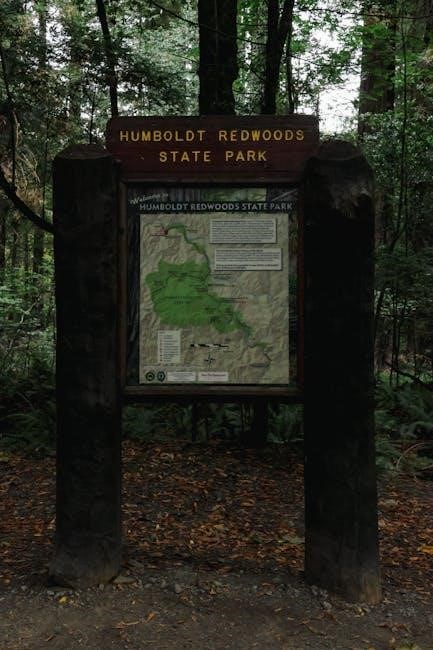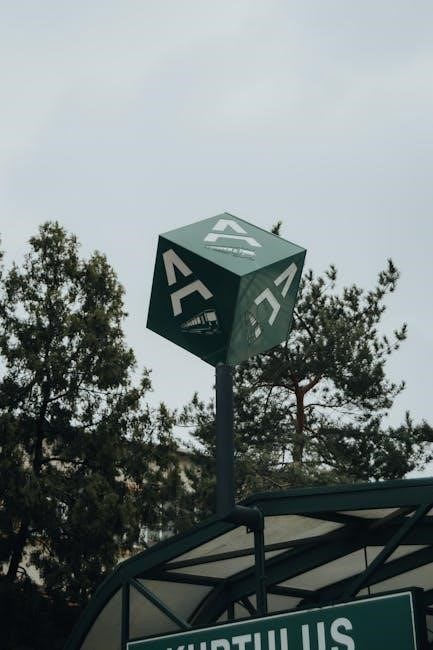The Delta Green Handler’s Guide is the GM’s essential resource, detailing the setting’s background, scenario creation, and integrating Lovecraftian elements. It emphasizes mystery and suspense, crucial for crafting immersive experiences.

Overview of the Delta Green RPG
Delta Green: The Roleplaying Game is a Lovecraftian horror RPG where players take on the roles of agents combating supernatural threats. Set in a world of espionage and cosmic terror, the game blends investigative gameplay with chilling scenarios. Agents must uncover mysteries, decipher clues, and confront eldritch horrors, all while grappling with the psychological toll of their duties. The RPG emphasizes detective work, with players gathering and analyzing information to solve cases; Missions often involve high stakes, moral dilemmas, and the grim reality of sacrifice, creating a tense and immersive experience that challenges both skill and sanity.
Role of the Handler in the Game
The Handler acts as the game moderator, guiding players through the world of Delta Green. They craft scenarios, control NPCs, and maintain suspense, ensuring a balance between mystery and combat. Handlers must prepare detailed backgrounds, rituals, and entities while adapting to player choices. Their role is crucial in creating an immersive experience, emphasizing the grim realities and psychological impact on agents. The Handler’s Guide provides tools for scenario design, entity descriptions, and historical context, empowering Handlers to weave compelling narratives that challenge players and keep them engaged in the eerie, Lovecraftian universe of Delta Green.
Key Themes and Tone of the Game
Delta Green revolves around cosmic horror, government conspiracies, and the existential threat of the Cthulhu Mythos. The tone is dark, suspenseful, and grim, emphasizing the psychological toll on agents. Themes include the unknown, paranoia, and the cost of confronting eldritch horrors. The game balances mystery and combat, creating a tense atmosphere where survival is uncertain. Handlers must maintain an eerie, unsettling tone, immersing players in a world where humanity is fragile and reality is fragile; The guide ensures this tone is preserved, offering tools to craft scenarios that evoke dread and keep players on edge, true to Lovecraftian horror.

The History of Delta Green
Delta Green traces its origins to the 1920s as a secret U.S. government program combating supernatural threats. It evolved during WWII, engaging in occult warfare, and continues today, addressing modern, Lovecraftian menaces while maintaining covert operations to protect global stability and conceal horrifying truths from the public.
Early Origins and Development
Delta Green emerged in the 1920s as a secret U.S. government program, initially focused on investigating and combating supernatural threats. Its early years were marked by clandestine operations, often overlapping with federal agencies like the FBI. The program’s formation was spurred by the discovery of occult activities and otherworldly phenomena during World War I. By the 1940s, Delta Green had solidified its role as a covert task force, operating outside official channels to protect national security from unseen horrors. This period laid the groundwork for its evolution into a global, secretive organization dedicated to countering Lovecraftian menaces.
Evolution Through World War II
During World War II, Delta Green expanded its operations, becoming deeply entangled in the war effort. The organization encountered and countered Nazi occult practices, uncovering horrifying rituals tied to the Cthulhu Mythos. Agents faced unimaginable threats, from summoned entities to hypergeometric anomalies. The war accelerated Delta Green’s evolution, forcing it to adopt more aggressive strategies and expand its reach globally. This period solidified its role as a clandestine force, operating outside conventional military chains of command. The horrors of WWII shaped Delta Green’s grim worldview, preparing it for the shadowy, high-stakes operations of the Cold War era and beyond.

Modern-Day Operations and Relevance
In the modern era, Delta Green operates as a shadowy, decentralized organization, tackling threats that defy conventional understanding. Agents confront contemporary horrors, from cyberterrorism linked to the Mythos to biotech abominations. The guide emphasizes the relevance of Delta Green in today’s world, where ancient myths intersect with cutting-edge technology. Handlers must balance the need for secrecy with the urgency of global threats, blending investigative work with direct action. Modern operations highlight the organization’s adaptability, ensuring its continued role as humanity’s clandestine shield against the unknowable. This section underscores how Delta Green remains vital in addressing the evolving terrors of the 21st century.

The Cthulhu Mythos in Delta Green
The Cthulhu Mythos in Delta Green introduces cosmic entities like Cthulhu, horrifying rituals, and reality-shattering threats, immersing players in existential dread and Lovecraftian horror.
Core Entities and Their Roles
The Cthulhu Mythos in Delta Green features iconic entities like Cthulhu, Shub-Niggurath, and Nyarlathotep, each serving distinct roles in unraveling sanity and reality. These beings embody cosmic horrors, driving the narrative’s existential dread. Handlers can use them to craft scenarios that highlight their unique abilities and agendas, ensuring players face unparalleled threats. The Great Old Ones symbolize unstoppable forces, while lesser entities like Deep Ones or Cultists act as minions, creating layers of tension. Hypergeometric entities further distort reality, challenging agents to comprehend unimaginable dangers. Understanding these roles allows Handlers to weave intricate, terrifying stories that immerse players in Lovecraftian despair.
Horrifying Rituals and Their Impact
Rituals in Delta Green are central to unleashing cosmic horrors, often requiring specific conditions and sacrifices. These rituals disrupt reality, summoning entities or altering the fabric of existence. Handlers can use rituals to escalate tension, as agents race to prevent cataclysmic outcomes. Rituals also serve as plot devices, revealing clues about ancient Mythos forces. Players must investigate and disrupt these ceremonies, facing psychological trauma and existential dread. The Handler’s Guide provides detailed mechanics for crafting rituals, ensuring they feel menacing and unpredictable. By integrating rituals, Handlers create scenarios where the stakes are apocalyptic, heightening the sense of desperation and cosmic insignificance.
Hypergeometry and Reality-Shattering Threats
Hypergeometry in Delta Green represents the mind-shattering, non-Euclidean constructs tied to the Cthulhu Mythos. These reality-warping phenomena defy human comprehension, creating unstable dimensions, portals, or entities that distort the laws of physics. Handlers can use hypergeometry to craft threats that feel incomprehensibly alien, such as shifting landscapes or invisible geometries. These elements amplify the sense of cosmic dread, as agents confront phenomena beyond human control. The Handler’s Guide provides tools to integrate hypergeometry into scenarios, creating unsettling environments and enemies that blur the line between reality and madness. This mechanic ensures players face existential horrors that challenge their understanding of the world.

Creating Scenarios and Campaigns
Delta Green scenarios blend Lovecraftian horror with investigative gameplay, requiring Handlers to craft mysteries that challenge agents’ skills and sanity. The Handler’s Guide offers tips for designing immersive, high-stakes campaigns that balance dread and detection, ensuring players uncover clues and confront existential threats.
Designing Engaging and Challenging Missions
Designing missions for Delta Green requires balancing mystery, horror, and action. Handlers must create scenarios that challenge agents’ investigative skills and confront them with unimaginable threats. Missions should include critical clues, NPCs with hidden agendas, and branching paths to keep players engaged. The Handler’s Guide provides tips for crafting operations that slowly build tension, leading to climactic confrontations with otherworldly entities. By integrating hypergeometry and rituals, missions can shatter reality, immersing players in a world of cosmic dread. Ensuring each mission reflects the grim, sacrifices-filled reality of Delta Green’s world is key to a compelling narrative.
Integrating Lovecraftian Horror Elements
Lovecraftian horror is central to Delta Green, emphasizing cosmic dread, the unknown, and humanity’s insignificance. Handlers should craft scenarios that evoke eerie atmospheres, mysterious rituals, and encounters with otherworldly entities. Rituals, hypergeometry, and reality-shattering threats create a sense of inescapable doom. Players must uncover clues about ancient deities and forbidden knowledge, fostering a sense of investigative dread. The Handler’s Guide provides tools to integrate these elements seamlessly, ensuring missions feel tense and terrifying. By balancing mystery and horror, Handlers can create unforgettable experiences that leave players grappling with the existential terror of the Cthulhu Mythos.

Tips for Balancing Mystery and Combat
Tips for Balancing Mystery and Combat
Balancing mystery and combat in Delta Green requires careful pacing. Handlers should ensure players have enough clues to solve mysteries without overwhelming them. Combat scenarios should be intense but not overshadow the investigative aspects. Use downtime and intrigue to build suspense, making each encounter meaningful. The Handler’s Guide advises providing clear objectives and resources for agents to uncover plot threads. Mixing horror elements into both combat and mystery keeps players engaged and invested in the story. This balance creates a tense, immersive experience, blending Lovecraftian dread with strategic gameplay seamlessly.

Managing Player Agents and Operatives
Delta Green agents face grim realities, requiring handlers to focus on character development and sacrifices. Maintaining intrigue and suspense ensures operatives remain invested in the mission’s dark outcomes.
Character Creation and Development
Character creation in Delta Green demands depth, with agents crafted to confront existential horrors.Handlers guide players in shaping operatives with distinct skills and psychological flaws, ensuring their growth reflects the grim reality of their missions. Agents’ backgrounds and personal motivations are crucial, as they often face moral dilemmas and terrifying entities. Development is organic, shaped by the traumas and sacrifices made during operations. This approach ensures each character’s journey is unique, adding emotional weight to the game’s dark narrative and making their ultimate fates deeply impactful.
Handling Sacrifices and Grim Realities
In Delta Green, sacrifices are inevitable, and Handlers must depict these grim realities with care. Agents often face irreversible consequences, such as physical trauma, psychological breakdowns, or even death. Handlers should emphasize the emotional weight of these sacrifices, making players feel the cost of their choices. This creates a deeper investment in the story and heightens the game’s dark, Lovecraftian tone. By balancing hopelessness with moments of resilience, Handlers can craft narratives that are both haunting and memorable, ensuring the game’s bleak atmosphere remains impactful without becoming overwhelming.
Maintaining Intrigue and Suspense
Maintaining intrigue and suspense is crucial in Delta Green, as it keeps players engaged and immersed in the game’s dark, Lovecraftian world. Handlers should carefully distribute clues and information, ensuring players feel progress without revealing too much too soon. Use red herrings, cryptic NPCs, and unsettling environments to build tension. Encourage players to investigate and theorize, fostering a sense of mystery. Pacing is key—slowly reveal threats to create anticipation and dread. By balancing mystery with moments of clarity, Handlers can craft a gripping narrative that keeps players on edge, ensuring the game’s suspenseful atmosphere remains unforgettable.

Advanced Handler Strategies
Advanced Handler Strategies involve mastering storytelling, using NPCs effectively, and adapting scenarios dynamically. These techniques enhance immersion and challenge, ensuring a compelling experience for players.
Mastering the Art of Storytelling in Delta Green

Storytelling in Delta Green requires creating immersive, Lovecraftian narratives that emphasize mystery and suspense. Handlers must weave together historical elements, conspiracies, and cosmic horror to engage players. Crafting compelling NPCs, rituals, and hypergeometry threats enhances the eerie atmosphere. The guide offers tips on campaign design, balancing mystery with combat, and maintaining intrigue. By integrating rich lore and dynamic scenarios, handlers can ensure a gripping experience, keeping players invested in uncovering the dark secrets of the Delta Green universe. Effective storytelling is key to capturing the grim, realistic tone that defines the game.
Using NPCs Effectively
Non-Player Characters (NPCs) are vital in Delta Green for creating immersive stories and conveying the game’s grim, Lovecraftian tone. Handlers should craft NPCs with distinct personalities, motives, and backstories to add depth and realism. Use NPCs to reveal clues, provide context, or mislead agents, enhancing the investigative nature of the game. Memorable NPCs can evoke fear, sympathy, or suspicion, enriching the narrative. Ensure NPCs align with the setting’s dark themes, leveraging rituals, conspiracies, and cosmic horrors to deepen the mystery. Effective NPC utilization keeps players engaged and invested in uncovering the unsettling truths of the Delta Green universe.
Adapting to Player Choices and Outcomes
Adaptability is crucial for Handlers, as player choices can drastically alter the game’s direction. To maintain engagement, prepare flexible scenarios and branching narratives that account for different player decisions. Anticipate key outcomes and have contingency plans ready to ensure the story remains cohesive. Encourage player agency by allowing their choices to meaningfully impact the world and its mysteries. This approach fosters a dynamic, immersive experience, keeping the game exciting and unpredictable. By staying flexible and responsive, Handlers can seamlessly integrate player actions into the unfolding horror, ensuring every session feels unique and tailored to the agents’ decisions.
